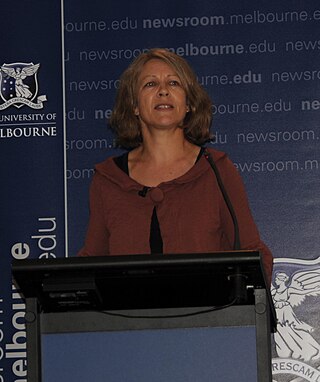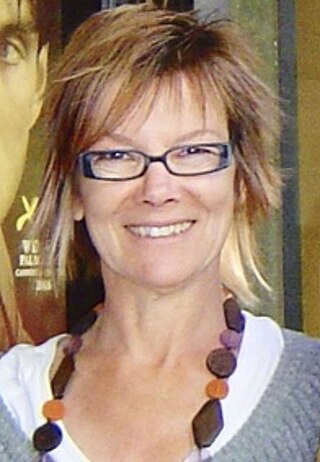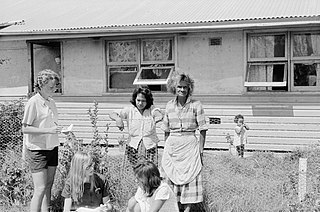A green ban is a form of strike action, usually taken by a trade union or other organised labour group, which is conducted for environmentalist or conservationist purposes. They were mainly done in Australia in the 1970s, led by the Builders Labourers Federation (BLF) and used to protect parkland, low-income housing and buildings with historical significance. At times, industrial action was used in relation to other issues, such as when a 'pink ban' was placed on Macquarie University due to the expulsion of Jeremy Fisher, a gay man, from student housing.
Stuart Forbes Macintyre was an Australian historian, and Dean of the Faculty of Arts at the University of Melbourne from 1999 to 2008. He was voted one of Australia's most influential historians.

Robyn Eckersley is a Professor and Head of Political Science in the School of Social and Political Sciences, University of Melbourne, Australia.
Andrew John Milner is Professor Emeritus of English and Comparative Literature at Monash University. From 2014 until 2019 he was also Honorary Professor of English and Comparative Literary Studies at the University of Warwick. In 2013 he was Ludwig Hirschfeld Mack Visiting Professor of Australian Studies at the Institut für Englische Philologie, Freie Universität Berlin.

Meredith Anne Burgmann is an Australian politician and Labor Party member and a former President of the New South Wales Legislative Council.
Power, Profit and Protest: Australian Social Movements and Globalisation is a 2003 book by Verity Burgmann.
Peter Beilharz is an Australian sociologist. He is professor of critical theory at Sichuan University, Chengdu, PRC. Previously he was professor of sociology and remains Emeritus Professor at La Trobe University, Melbourne. He is adjunct professor at Curtin University, Perth, Western Australia. Beilharz is founding editor of the international journal of social theory Thesis Eleven published by Sage.

Jennifer Jane Hocking is an Australian historian, political scientist and biographer. She is the inaugural Distinguished Whitlam Fellow with the Whitlam Institute at Western Sydney University, Emeritus Professor at Monash University, and former Director of the National Centre for Australian Studies at Monash University. Her work is in two key areas, counter-terrorism and Australian political biography. In both areas she explores Australian democratic practice, the relationship between the arms of government, and aspects of Australian political history. Her research into the life of former Australian prime minister Gough Whitlam uncovered significant new material on the role of High Court justice Sir Anthony Mason in the dismissal of the Whitlam government. This has been described as "a discovery of historical importance". Since 2001 Hocking has been a member of the Board of Trustees of the Lionel Murphy Foundation.
Hilary Jane McPhee is an Australian writer and editor. She was awarded an Order of Australia for service to the Arts in 2003.
Joan Errington Beaumont, is an Australian historian and academic, who specialises in foreign policy and the Australian experience of war. She is professor emerita in the Strategic and Defence Studies Centre at the Australian National University.
Ponch Hawkes is an Australian photographer whose work explores intergenerational relationships, queer identity and LGBTQI+ rights, the female body, masculinity, and women at work, capturing key moments in Australia's cultural and social histories.
The Barbara Ramsden Award was administered by Fellowship of Australian Writers and awarded annually to an author and editor in recognition of the efforts of both parties to produce a quality fiction or non-fiction book. The winners receive a memorial plaque. It was established in 1971 and was awarded annually until 1992. It was reestablished in 2006 with sponsorship from Society of Editors (Victoria) Inc. The award was named after Australian editor Barbara Ramsden (1903–1971). It was cancelled in 2016.
Diane Joyce Austin-Broos is an anthropologist from Australia. She is a Professor Emeritus at the University of Sydney; her major research areas are Jamaica and Central Australia.

Ann Curthoys, is an Australian historian and academic.
Christina Louise Twomey, is an Australian historian and academic.
Raelene Frances, is an Australian historian and academic at the Australian National University.
Lynette Wendy Russell, is an Australian historian, known for her work on the history of Indigenous Australians; in particular, anthropological history ; archaeology; gender and race, Indigenous oral history, and museum studies.
Marian Quartly is an Australian social historian. She is professor emeritus in history at Monash University.
Diane Elizabeth Kirkby, is an Australian historian. She is Professor of Law and Humanities at the University of Technology Sydney and professor emeritus of History at La Trobe University. Since 2016, Kirkby has been the editor of Labour History, the journal of the Australian Society for the Study of Labour History.
Ann Margaret McGrath is an Australian historian and academic. As of 2023 she is the WK Hancock Chair of History at the Australian National University.



